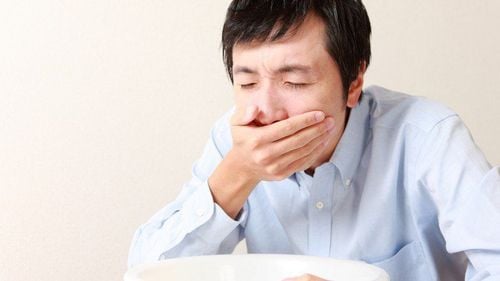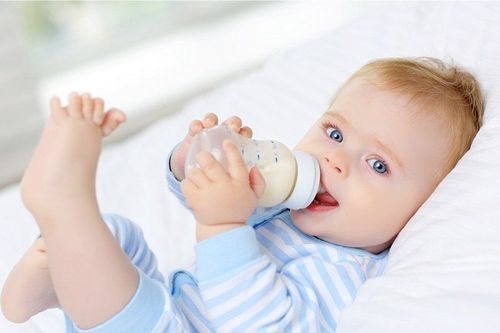This is an automatically translated article.
Cavity syndrome due to normal feeding is most common in children aged 2-4 years. This syndrome usually progresses very quickly and occurs in many teeth at the same time. The treatment of this syndrome with young children is difficult and complicated. Therefore, you need to pay more attention to the problem of preventing baby teeth from decaying. If not detected and treated early, teeth can be damaged causing pain and greatly affect the process of replacing teeth later.
1. What is bottle-feeding caries syndrome?
This is a condition where baby teeth are decayed in children between the ages of 2 and 4 years old. The main reason is due to the habit of bottle-feeding with products containing a lot of lactose for quite a long time. The typical feature is caries in many teeth at the same time and progresses very quickly. According to statistics, with the rate of children infected accounting for about 11%, but it is also on a decreasing trend.
Bottle-feeding caries syndrome also seriously affects oral health as well as general health. If not treated early, this syndrome is likely to get worse. The consequences are affecting the function of eating, chewing and the development of permanent teeth. In addition, baby teeth are often weaker than permanent teeth, so caries bacteria are easy to thrive, causing damage and serious damage to teeth.
2. Why does bottle-feeding cause tooth decay?
The direct cause of this caries syndrome is the habit of bottle-feeding. Usually, bottle feeding is common in babies under 12 months of age. Using a feeding bottle can prevent choking and suffocation while feeding. However, if you maintain this bottle-feeding habit for a long time, tooth decay can develop on incisors, canines, premolars and some other teeth with a very rapid spread.
Bottle-fed babies are harmful to their teeth because they often cause sugar to accumulate between the teeth and the outer surface, creating conditions for bacteria to grow, causing tooth decay.
Some typical causes of caries syndrome in young children:
Accumulation of sugar from milk: The food of infants under 12 months is mainly breast milk and milk products. Due to the habit of drinking for a long time, sugar accumulates in the interdental spaces, creating conditions for bacteria to form, leading to tooth decay. Poor oral hygiene: Many parents do not pay attention to daily oral hygiene for their children, leading to tartar and bacterial growth. Dental caries due to normal feeding occurs in children who do not have regular and proper oral hygiene. Some other causes: The habit of forming a habit of regular bottle-feeding while sleeping, holding a bottle continuously,... increases the risk of bottle-feeding caries syndrome. In addition, the use of milk containing a lot of sugar and flavoring also causes a high risk of tooth decay in children.
3. Manifestations of bottle-feeding caries syndrome
The condition of teeth with caries due to bottle feeding, if there is no timely treatment, it is easy to develop quickly, leading to caries eating into the dentin, pulp and causing damage to the apex, alveolar bone, etc. ..Here are the signs to recognize bottle-feeding with tooth decay in young children:
On the teeth appear deep, jagged holes with a dark brown color. Cavities progress very quickly and spread to adjacent teeth. In just a short time, the cavity can eat into the dentin and pulp of the tooth. Normal feeding caries is found in the canines, incisors and maxillary incisors. Usually, when the tooth is decayed, it will cause toothache and the pain level increases significantly when eating. Because babies of bottle-feeding age are still quite young, the perception of pain will be different from older children. Often in children with pain, they will often cry, stop eating, tired, ... you can notice your child's symptoms to find the cause and treat it. Because of the nature of baby teeth, they are temporary teeth that erupt in the early stages of life until the age of 7-10 years. As a result, baby teeth are often soft, vulnerable, and thin enamel. Therefore, the situation of tooth decay in children has progressed very quickly. If not controlled early, the baby's entire teeth can be severely damaged and affect the process of replacing new teeth later.
4. Does bottle-feeding have any effect on tooth decay?
Dental caries is a common dental disease in children and adults. Especially, tooth decay caused by bottle-feeding has a rapid progression and is easy to cause complications if it is not examined and treated promptly. It directly affects the overall health and physical and intellectual development of children.
If not detected and treated early, can cause severe tooth damage. Here are the complications and effects of bottle-fed caries syndrome:
Local complications: Uncontrolled caries can create conditions for bacteria to grow and spread. This condition leads to septal syndrome, cellulitis, teething dysfunction, pulpitis, root abscess, etc. In the long term, it also negatively affects the dental system and chewing function. of teeth. Systemic complications: Not only stop at local complications, but bacteria can also move into the blood circulation to other organs, causing diseases such as diabetes, kidney disease, endocarditis In addition, this syndrome also makes children anorexia, stop eating, poor feeding, difficulty sleeping and fatigue. If this situation is prolonged, it can cause weight loss, malnutrition, growth retardation, and anxiety when children communicate and play with friends.
5. Treatment of tooth decay caused by bottle-feeding in young children
The condition of tooth decay in children greatly affects the oral health and overall development of the baby. If your child has any abnormal symptoms, take him to a medical facility and see a doctor for timely examination and treatment. Because bottle-feeding caries syndrome progresses very quickly and affects the baby's chewing function.
Here are some typical treatment measures:
5.1. Changing oral hygiene habits Decayed milk teeth affect the oral health of children. Teach your child a habit of regular oral hygiene. Rinse mouth after each milk drink or drink soft drinks, eat cake, ... Do not let the child sleep with the bottle. Adjust your baby's diet low in sugar. Control the plaque on your baby's teeth to avoid bottle feeding that causes tooth decay.
5.2. Extraction of decayed teeth This is the treatment applied to cases where the tooth decay is too severe. When the structure of the tooth is severely damaged and there is a risk of affecting the tooth germ, it is imperative to remove the decayed tooth. However, the process of tooth extraction will greatly affect the chewing function of the baby. Therefore, you should control and treat your baby early to avoid tooth decay spreading to many other teeth.
5.3. Apply Fluor
The consequences of tooth decay are actually the process of destroying enamel minerals. Fluoride is known to be an essential mineral for enamel remineralization. For small cavities, the doctor will prescribe fluoride to compensate to prevent bacteria from penetrating deep inside the tooth. You can find products like gels, mouthwashes, or fluoride toothpastes for your baby to use. This also greatly improves the condition of tooth decay and improves oral health for children.
5.4. Dental fillings This is a popular method of treating tooth decay today. Usually, this method is used when the enamel and dentin are affected, helping to prevent bacteria from growing and effectively protecting the baby's teeth. In addition, if it is discovered that any teeth are at risk of decay, the doctor will appoint a filling to proactively prevent them.
The mechanism of this method is to use specialized tools and materials to fill in damaged and missing places on the teeth. From there, it helps to restore chipped, or decayed, unsightly teeth to their original shape. But in case of severe tooth decay, the doctor will proceed to scrape the infected part of the tooth with a filling behind it.
This method is considered to be safe for baby's health and chewing function. Protect teeth against bacterial agents and bring aesthetics to teeth.
5.5. Take the tooth pulp In case of tooth decay eating into the pulp causing pulp necrosis, pulpitis, the doctor will be appointed to take the tooth pulp. The process of taking the tooth pulp will suck out the dead tooth pulp (inflammation / necrosis), then clean the canal and fill in the gaps with specialized tools such as cement, Composite plastic or porcelain,. This method is relatively complicated, so it will take 1-2 weeks to complete and this method will cause dull pain, teeth are also easier to fall out than other methods.
However, if after the root canal is done, the toothache is still a lot, you should go to the dentist to check and handle it in time to limit possible bad complications. So, to protect your baby's oral health carefully.
6. Preventing tooth decay syndrome caused by bottle feeding
To protect children's oral health. You should let children take measures to prevent tooth decay as follows:
Practice good oral hygiene habits for children who are 3 years old and older. Create excitement for children to brush their teeth by buying cute, funny-shaped toothbrushes and using fruit-scented toothpaste lines such as oranges, strawberries, etc. Once your kids have gotten used to brushing, you'll be fine. Children should be instructed to use dental floss or mild mouthwashes. Take care of your teeth as soon as your baby has his or her first teeth Give your child enough water from 12 or 18 months to stop bottle feeding Improve oral hygiene knowledge for pregnant and postpartum mothers Choose types Contains natural sugars from vegetables and synthetic sugars to minimize tooth decay. Avoid giving children food, confectionery and carbonated soft drinks, etc. After eating, they should rinse their mouth with water to remove leftovers. Regularly let children go to the dentist once every 3 months to detect and treat dental problems early. Bottle-feeding caries syndrome is the leading cause of tooth loss, affecting chewing function and overall health of your baby. Therefore, you need to take the initiative to prevent and take your child to the dentist as soon as you detect unusual symptoms in your child. Wish your baby have a strong teeth.
Please dial HOTLINE for more information or register for an appointment HERE. Download MyVinmec app to make appointments faster and to manage your bookings easily.













